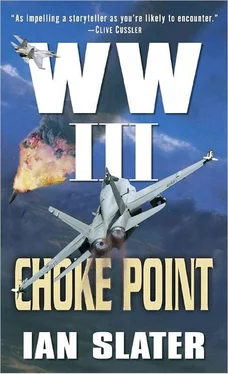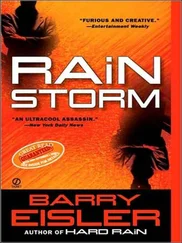Any anxiety Freeman might have had about the fog rolling in, now completely obscuring the falls, was not evident in his brisk, eager preparations. He assisted Sal in mounting the stripped-down SEAL version M-60 on the bow’s pivot mount as the noise of the falls smothered all sounds save the deep, pulsating rumble that he and the other four men assumed was the sub’s diesel-electric warming up, readying for imminent departure.
“Two minutes!” shouted Choir, keeping the RIB’s Volvo Penta inboard purring, while Sal, the M-60 now secure, took the fourteen-foot spiked pike from its quick-release rack that ran along the port side, pushing the pole against the islet to keep the RIB clear of the dangerous, barnacle-clad projection of rock that appeared and disappeared threateningly with each suck and surge of the sea.
For Sal, the kind of vigilance needed to keep the sixteen-foot boat from being tipped over through contact with the protruding ledge proved more stressful than combat, and he remembered that for David Brentwood, the most trying part of a mission had always been going over the Rules of Engagement. The Medal of Honor winner was always concerned that he might commit a blue on blue — an attack on his own forces. Sal knew it was a different source of tension than he felt, but the effect was the same: They almost welcomed combat as a release, not only from the immediate anxiety of the situation, but from the tension of life itself.
As Choir gave the RIB engine its head, the waterfall speeding toward them, Sal quickly left his roll bar position to reach the bow-mounted M-60. “Hold on and duck!” yelled Choir. The RIB struck the waterfall at thirty-five miles an hour, all three men fighting against instinctively closing their eyes, the ice-white thunder collapsing all around, slamming them into the swirling maelstrom of foam on the deck. Then they were through.
Freeman heard the unmistakable rip of Kalashnikov bullets peppering the whirlpools about the RIB, the craft’s series of neoprene inflatable cells along the starboard midships section exploding like popcorn. Choir, seeing the team’s hoped-for surprise popped along with the inflatable cells, opened up the Volvo Penta, the RIB’s bow fairly leaping out of the salt chuck, hitting 35 knots as it sped past the sun-sparkling curtain of falls, with only ninety feet to go to the sub.
“Turning!” Choir yelled, then, “Hard right!” so loudly there was no possibility of either Freeman or Sal not hearing him, despite the rip of the M-60’s one-in-three tracer, almost a red line at that close range.
With barely forty feet to go, Sal’s M-60 fire was wild and unavoidably inaccurate in the RIB’s hard, brain-pummeling progress against the relatively calmer but still rough water between the RIB and the sub. Choir dropped the speed to twenty knots, simultaneously wrenching the wheel astarboard, further confounding the enemy’s aim. Salvini, given forewarning of the turn and having seen that his previous M-60 bursts were too high, dropped the barrel down an inch or so and raked the upper lip of a dark, thirty-foot-wide cave mouth he could now discern immediately behind the docked sub. He also raked the long, black “floating log” of a sub. The midget’s ten-foot-long sail, or conning tower, was a black lump that sparked with the fiery orange hits of his sustained burst, which was completely ineffective, as Sal knew it would be, against the high-tensile steel. But his firing had at least forced the sub’s AK-47-armed lookouts to run for cover.
Two of them were hit as they raced from the sub’s bow along its deck, heading for the narrow, covered walkway that led inshore from the sub’s sail toward the cave. Salvini’s M-60 rounds kept coming, and he cut them down, one man toppling into the water, thrashing about in an agony that ceased with a quick burst from Freeman’s HK, the other one up and running again until the general’s 9mm bullets finished his desperate sprint. Normally, the parabellum rounds he’d just fired had less stopping power, particularly when sprayed at obtuse angles, but the general had fired a tight group of three rounds more or less straight in over the forty-foot range. The other reason the bullets had proved so deadly and weren’t “bee stings,” as Freeman was wont to say, was that — in direct contravention of the Geneva Accords — he’d used HydroShok ammo rather than legal “hard ball.” The frangible head of the HydroShok expanded inside the recipient’s body the nanosecond he was struck.
“Where the hell are our swimmers?” Sal shouted.
“Underwater!” replied Freeman. “Where I’d be with all this crap flying—” His sentence went unfinished as Choir drove the RIB through a dangerously unstable S pattern, which further confounded the enemy’s aim and forced Freeman to grab the roll bar, letting forth a burst of obscenities which only a longshoreman and Aussie Lewis, if he was still alive, could have fully interpreted.
At the moment, however, Aussie Lewis and Dixon were fighting for their lives. They’d seen two dark shapes diving from the sub’s deck, both bearing knives — not the standard K-bar blades or expensive Randalls, but eighteen-inch bayonets that would pass right through a man, with steel to spare. Alarmed, Dixon glanced across at Aussie, who pointed down and drew his hand across his throat, a move that caused Dixon to gulp and swallow a huge bubble from the fierce “wash cycle” churned up by Choir’s effective but bone-busting evasive antics. The Welshman’s “crazy pattern” wake all but covered the moat area with bubbles, which temporarily kept both pairs of divers from each other as well as from their respective surface combatants.
The RIB, careening successfully at first, crisscrossing the moat behind the falls and sub, now came under steady and heavy automated fire from the cave behind the sub. Below, the two pairs of divers engaged, without circling each other or using any of the fancy energy-wasting tricks and turns imagined by some who have never been swimming for their lives. In the sand-stirred undersea world bounded by the falls and the submarine, the soft sound of rubber fins was obliterated by the high whine of the RIB’s engine and the increasing rumble of the sub’s diesel.
Aussie, intending to take the initiative, closed with his opposite number, who kicked hard in a burst of speed, trying to drive home the overreach of his bayonet through Lewis’s chest. Aussie slowed, trading speed for accuracy of impact. The enemy’s first right-handed bayonet thrust was short, a feint that drew in Aussie’s K-bar, which Aussie’s opponent smartly deflected with a smaller blade that had suddenly materialized in his left hand. Aussie, against all logic, released his grip on his parried right hand, gripping the enemy’s knife wrist instead, the enemy diver driving his bayonet in a flurry of effervesced water hard toward Aussie’s chest. Aussie twisted, the bayonet slicing clean through his Draeger’s left-side hose and ricocheting off the Draeger’s chest-mounted housing. Then Aussie kicked once, bringing up his free left hand, thrusting hard, striking the other swimmer’s mask with such force it was knocked away from the man’s face, the expelled air momentarily blinding both him and Aussie. But with his mask still on, Aussie had the better of it. When his opponent turned frantically to retrieve his own mask, Aussie brought his right knee up hard into the man’s scrotum. The man’s mouth agape with the shock of the hit, he involuntarily gulped in seawater, which Lewis knew would drown all discipline and training his opponent might have.
In an intuitive act of survival, Aussie’s opponent rose quickly toward the surface for air. Any breath his lungs might have had in reserve was now depleted, the bubbles rising from his transit to the surface joining those coming from Aussie’s left hand as Lewis grabbed the man’s right leg as it passed in front of him and, with one savage slash of his K-bar’s blue steel, sliced through the man’s neoprene sheath with such fury that it cut to the bone. A cloud of cherry-red blood obscured Aussie’s view before it was quickly diluted to a watermelon pink, through which Aussie glimpsed the tail end of a school of salmon, which he now realized had been all around them and were fleeing — perhaps, Aussie thought, because of approaching sharks. He kicked with all the energy he had, his fins propelling him fast toward the surface, the whine of the RIB engine piercing his eardrums as he crashed into the frenzied body of his opponent at the surface. The wounded man, gulping in the icy, pristine air above the roiling blue, had realized he was no longer able to swim.
Читать дальше












